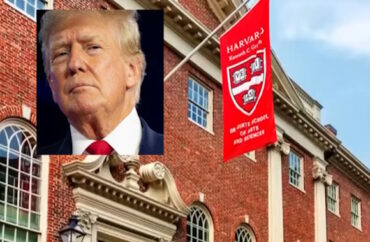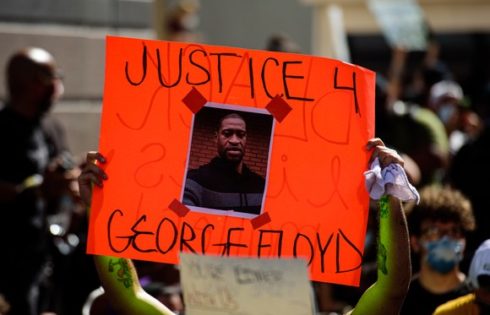
Harvard University and its student-run journal, Harvard Law Review, are under investigation by the U.S. Department of Education and the U.S. Department of Health and Human Services over allegations “of race-based discrimination permeating the operations of the journal.”
The probe, announced April 28, cites claims that Harvard Law Review’s editor reportedly wrote it was “concerning” that “[f]our of the five people” who wanted to reply to an article about police reform “are white men.”
“Another HLR editor suggested ‘that a piece should be subject to expedited review because the author was a minority,’” according to a news release from the education department.
“The allocation of opportunities or recognition based on race can deprive other students of educational opportunities to which they would be entitled by merit, which is unacceptable for recipients of federal funding,” it stated.
Acting Assistant Secretary for Civil Rights Craig Trainor said in a statement “Harvard Law Review’s article selection process appears to pick winners and losers on the basis of race, employing a spoils system in which the race of the legal scholar is as, if not more, important than the merit of the submission.”
The probe is the latest volley in the war between Harvard and the Trump administration.
The Ivy League university has refused to comply with administration demands to rein in diversity, equity and inclusion initiatives and crack down on antisemitism, and has filed a lawsuit, arguing the administration overstepped its authority when it paused $2.2 billion in funding. Meanwhile, Trump is threatening to revoke the school’s tax-exempt status.
As for the Harvard Law Review, it has “incorporated race into nearly every stage of its article selection process, which as a matter of policy considers ‘both substantive and DEI factors,’” according to the Washington Free Beacon, which exclusively reviewed eight different internal documents detailing alleged discrimination at the journal.
“Editors routinely kill or advance pieces based in part on the race of the author …with one editor even referring to an author’s race as a ‘negative’ when recommending that his article be cut from consideration,” the Beacon reported, citing the memos.
In these documents, the “editors argued that an author’s minority status counted in favor of publishing their article. ‘The author is a woman of color,’ read one 2024 memo. ‘This meets a lot of our priorities!’”
The Beacon also reported many law journal members are chosen by a “holistic review committee” that prioritizes race, gender identity, and sexual orientation as its “first priority.”
What’s more, the documents show the review “continued using race after the Supreme Court outlawed affirmative action in June 2023, implementing several DEI measures within the past year.”
In the federal agencies’ news release, Anthony Archeval, acting director of the HHS Office for Civil Rights, stated this is no small matter.
“Law journal membership and publication are crucial achievements that build momentum for law students’ careers and shape legal scholarship,” he stated. “This investigation reflects the Administration’s common-sense understanding that these opportunities should be earned through merit-based standards and not race.”
Further controversy surrounds the Harvard Law Review’s decision to award $65,000 fellowship to Ibrahim Bharmal, a law student at and Review editor who was charged with assaulting an Israeli classmate during a protest in October 2023.
Late last month, he was ordered to perform 80 hours of community service and take an anger management class “as part of a pretrial diversion program that will bring an end to the case,” the Beacon reported.
Harvard Law Review declined to comment to The College Fix.
According to Boston Law, law reviews have a major impact on law students and their future careers. Not only do the publications help shape the future of law, but they teach law students how to write and research. Being part of a law journal vastly helps students transition into the legal world.
Benjamin Ogilvie, a law student at the University of Chicago who uncovered discrimination based on political affiliation at three of the country’s top law school journals, said the problems alleged at Harvard Law Review mirror what he has found elsewhere. Ogilvie had focused his probes on Columbia and Northwestern universities, too.
“I am completely unsurprised by allegations that the Harvard Law Review is engaging in racial discrimination in the name of DEI,” Ogilvie told The College Fix in an email interview.
“Law reviews have two chances to discriminate: which students they select as staff and which articles they publish,” he said.
According to Ogilvie, law journals choose their staffers based on first-year grades, performance on a writing task, and a “personal statement” that can act as a way to practice and promote DEI.
“Law reviews are looser about how they choose articles than staff, and I’m not surprised at all to see DEI favoritism here; this probably happens at most law reviews,” he told The Fix.
“Getting an article published in a top-tier journal can do a lot to advance a professor’s career, and the process of choosing which articles get published is subjective. Progressive staffers are often eager to dole out that benefit to ‘underrepresented’ faculty to help advance their careers,” he said.
MORE: Conservative students appear blackballed from top law reviews
IMAGE CAPTION AND CREDIT: A photo of Trump superimposed over a picture of a building at Harvard / YouTube screenshots
Like The College Fix on Facebook / Follow us on Twitter






Please join the conversation about our stories on Facebook, Twitter, Instagram, Reddit, MeWe, Rumble, Gab, Minds and Gettr.